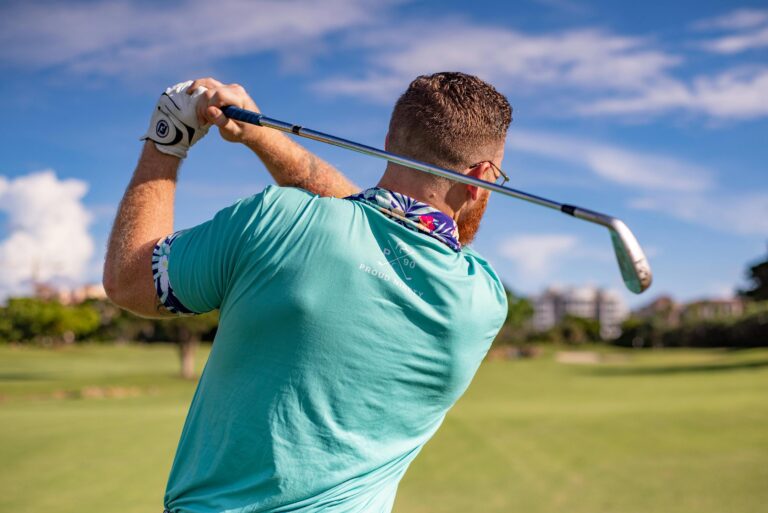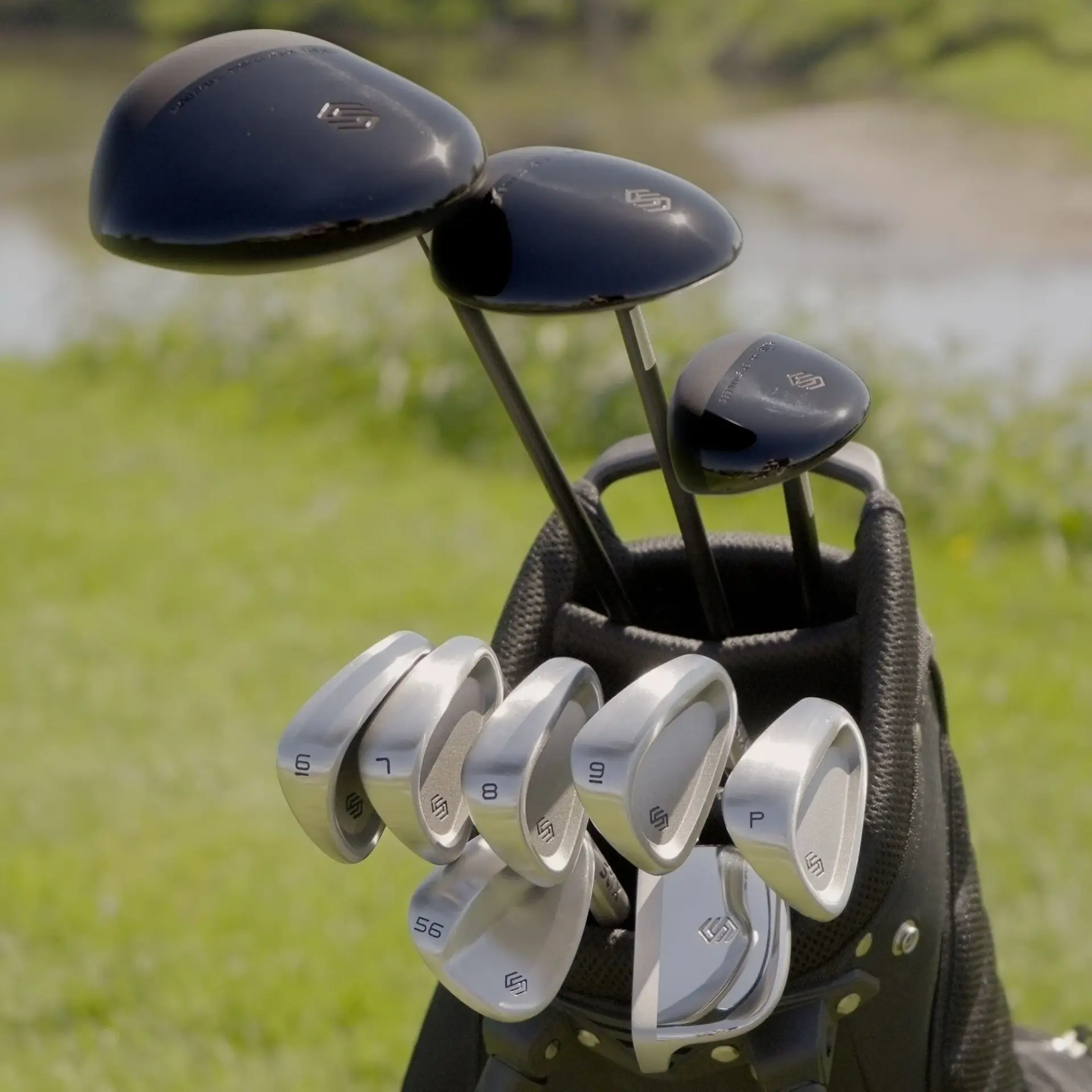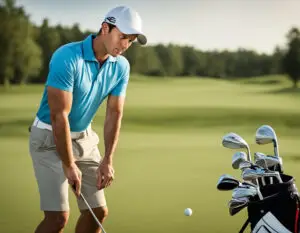Intro
Starting your golf journey can be both exciting and overwhelming, especially when it comes to selecting the essential golf clubs for beginners.
With so many options available, it’s easy to feel lost in the sea of choices.
However, the good news is that you don’t need an entire bag full of clubs to begin. In fact, focusing on just five key clubs will help you develop your skills without feeling intimidated.
Let’s dive into the must-have clubs that will set you up for success on the course!
Essential Golf Clubs for Beginners
Why Fewer Clubs Are Better for Beginners
Embarking on your golf journey with fewer clubs might seem counterintuitive, but it’s a strategic approach that can simplify your learning process and boost your confidence.
As a beginner, your primary objective is to grasp the fundamentals and keep the ball in play.
Starting with a limited selection of essential golf clubs for beginners allows you to focus on these goals without getting overwhelmed by too many options.
When you carry fewer clubs, your decision-making process becomes much easier.
You’re not constantly second-guessing which club to use for each shot, which helps you concentrate on perfecting your technique.
Instead of getting bogged down by the complexities of the game, you can devote your energy to mastering your swing and understanding how each club behaves.
This concentrated effort on a few key clubs accelerates your learning curve and helps you build a solid foundation.
Using fewer clubs also encourages repeated practice with the same equipment, which is crucial for skill development.
When you consistently practice with the same driver, hybrid, 8 iron, wedge, and putter, you become more familiar with their nuances and gain better control over your shots.
This familiarity translates to improved performance on the course as you start to feel more comfortable and confident with your clubs.
Additionally, starting with fewer clubs can be more cost-effective.
Golf can be an expensive sport, and investing in a full set of clubs right off the bat might not be necessary.
By focusing on the essential golf clubs for beginners, you can make a smaller initial investment while still having everything you need to enjoy the game and see progress.
Mentally, carrying fewer clubs can reduce stress and help you develop a more positive attitude towards the game.
Golf is as much a mental challenge as it is a physical one.
By simplifying your approach, you eliminate unnecessary complications and set yourself up for a more enjoyable experience.
You’ll be able to focus on each shot with clarity and purpose, which can lead to better results and a deeper love for the game.
In the end, starting with fewer clubs is about making your introduction to golf as smooth and encouraging as possible.
It’s about building a strong foundation, one swing at a time, with the essential tools you need to succeed.

Essential Golf Clubs for Beginners
The Driver
The driver stands out as one of the most exciting and essential golf clubs for beginners, thanks to its unique role in the game.
Known for its ability to send the ball soaring off the tee, the driver helps you achieve greater distances, which is crucial for setting up your subsequent shots.
As a beginner, mastering the driver can be both rewarding and a confidence booster.
Choosing the right driver is key to making the most of this club.
Look for a driver with a larger clubface and higher forgiveness, as these features can help you achieve better results even when your swing isn’t perfect.
A larger clubface increases the sweet spot, giving you a better chance of making solid contact with the ball.
High forgiveness means that even off-center hits can still travel a reasonable distance and stay on course, which is especially beneficial for those new to the game.
When you first start using the driver, focus on developing a smooth and controlled swing rather than trying to hit the ball as hard as possible.
Consistency is more important than power at this stage.
Practicing with the driver will help you understand its dynamics and get a feel for how it behaves.
Over time, as you become more comfortable, you can start to add power to your swing without sacrificing accuracy.
Another tip for beginners is to use tees of varying heights during practice sessions.
This can help you understand how different tee heights affect the trajectory and distance of your shots.
Experimenting with different setups will give you valuable insights into optimizing your performance with the driver.
In addition, many drivers come with adjustable features, such as loft settings and movable weights.
These can be incredibly useful for beginners as they allow you to customize the club to better suit your swing and playing style.
Don’t hesitate to seek advice from more experienced golfers or golf shop professionals to help you make these adjustments.
Remember, the driver is designed to set the stage for your round by putting you in a favorable position after your first shot.
By taking the time to practice and understand this essential golf club for beginners, you’ll be well on your way to improving your overall game and enjoying your time on the course.
Essential Golf Clubs for Beginners
Hybrids
A hybrid club is a fantastic addition to your beginner set, offering a blend of the best features from both woods and irons.
Hybrids are designed to be more forgiving and easier to hit, which is particularly beneficial for those new to the game.
The design of a hybrid club typically features a wider sole and a lower center of gravity, making it easier to get the ball airborne and achieve consistent contact.
For beginners, the versatility of a hybrid is a game-changer.
Whether you’re dealing with long approach shots, tricky lies, or navigating the rough, a hybrid can be your go-to club.
The higher loft and larger sweet spot make it easier to keep the ball in play, allowing you to focus on improving your swing without the frustration of frequent mishits.
This can significantly boost your confidence as you learn the game.
When choosing a hybrid, opt for one with a higher loft, usually between 19 to 22 degrees, as this will help you lift the ball off the ground more effortlessly.
Hybrids are particularly helpful when you’re transitioning from the tee to the fairway or when you need a reliable option for those longer shots where you might otherwise struggle with a traditional long iron.
One of the standout features of hybrids is their ability to perform well in various situations.
They can be used effectively for tee shots on shorter par-4s, fairway shots, and even for rescue situations in the rough or bunkers.
This adaptability makes them an invaluable part of your beginner golf club set.
Additionally, hybrids often come with a more forgiving face, which reduces the chances of off-center hits affecting your game dramatically.
This means that even if your swing isn’t perfect, the hybrid will help you achieve a more favorable outcome.
The confidence that comes from knowing you have a reliable club in your bag cannot be overstated; it allows you to focus on other aspects of your game and enjoy your time on the course.

Essential Golf Clubs for Beginners
8-Iron
The 8 iron is a fantastic club for beginners, offering a blend of control and versatility that is crucial for honing your skills.
Its loft and design make it perfect for those mid-range shots from the fairway or rough, providing a balance between distance and precision that can help you improve your overall game.
One of the key benefits of the 8 iron is its ease of use.
With its shorter shaft and higher loft, it allows for a more controlled and consistent swing.
This can be particularly encouraging for beginners who are still working on developing their technique.
The forgiving nature of the 8 iron means you’re more likely to achieve solid contact with the ball, resulting in more accurate shots and a boost in confidence.
Another advantage of the 8 iron is its versatility.
Whether you’re hitting approach shots, executing delicate chips around the green, or even escaping from tricky lies, the 8 iron is a reliable and effective tool.
This flexibility makes it an essential part of your beginner set, as it allows you to tackle a variety of situations on the course with one club.
The 8 iron also plays a crucial role in helping you develop a better understanding of your swing mechanics.
By practicing with this club, you’ll learn how to control your swing speed, manage your ball flight, and adjust your stance to achieve the desired shot.
These are fundamental skills that will serve you well as you progress in your golfing journey.
In addition, the 8 iron is ideal for working on your distance control and trajectory.
Its loft enables you to hit higher shots that land softly on the green, giving you a better chance of stopping the ball close to the pin.
This is especially important for beginners, as it can lead to more scoring opportunities and a more enjoyable experience on the course.
When choosing an 8 iron, look for one that feels comfortable in your hands and suits your swing style.
Don’t hesitate to try out a few different options before making a decision.
The right 8 iron can make a significant difference in your game, helping you build a strong foundation and develop your skills with confidence.

Essential Golf Clubs for Beginners
Wedge
For beginners looking to sharpen their short game, a wedge is a must-have club.
Wedges come in various types, but starting with a pitching wedge or sand wedge is ideal.
These clubs are specifically designed to help you achieve precision and control for those crucial shots around the green.
One of the biggest advantages of using a wedge is its ability to provide a high loft, which is perfect for lifting the ball into the air quickly and landing it softly on the green.
This makes wedges particularly effective for short approach shots, chips, and bunker play.
As you practice with your wedge, you’ll quickly notice how its design helps you navigate tricky spots and save strokes.
Control is a key aspect of the short game, and wedges offer you the ability to fine-tune your distance and trajectory.
Learning how to manipulate these factors will greatly improve your ability to get up and down from challenging positions.
For instance, a pitching wedge is great for longer approach shots and bump-and-run techniques, while a sand wedge excels in getting you out of bunkers or high grass with ease.
When practicing with your wedge, focus on developing a smooth, controlled swing.
Unlike longer clubs, wedges don’t require a full-force swing to be effective. Instead, emphasize finesse and precision.
Spend time practicing different types of shots, such as high lobs, low punches, and soft chips.
This will help you understand how to adjust your swing to achieve the desired shot.
Additionally, pay attention to the bounce of your wedge, which refers to the angle between the leading edge and the lowest point of the club’s sole.
Higher bounce wedges are great for softer turf and bunkers, while lower bounce options are better suited for firmer conditions.
Understanding these nuances will help you select the right wedge for various situations on the course.
Incorporating a wedge into your practice routine will not only enhance your short game but also build your overall confidence.
As you become more adept at using this versatile club, you’ll find yourself better equipped to handle a variety of challenges on the course, leading to a more enjoyable and successful golfing experience.
Essential Golf Clubs for Beginners
Putter
When it comes to lowering your scores and finishing each hole on a high note, the putter is your go-to club.
As a beginner, understanding the nuances of putting can significantly impact your overall performance and enjoyment of the game.
The putter is all about finesse and control, and dedicating time to mastering it will pay off in spades.
Selecting the right putter involves considering factors like weight, length, and design.
Mallet putters, with their larger heads and better stability, are often recommended for beginners.
They offer excellent alignment aids, making it easier to aim accurately.
On the other hand, blade putters provide more feel and feedback, which some players prefer.
Whichever style you choose, ensure it feels comfortable and suits your natural stroke.
One of the keys to effective putting is developing a consistent routine.
Spend time on the practice green working on your stroke mechanics, grip, and stance.
Pay attention to your tempo and strive for a smooth, pendulum-like motion. This consistency will help you build confidence and improve your accuracy over time.
Reading greens is another essential skill for putting.
Take a moment to assess the slope and grain of the green before you putt.
Understanding how the ball will break and adjusting your aim accordingly can make a significant difference in your success rate.
Practice different lengths and types of putts to get a feel for how the green affects the ball’s path.
Don’t overlook the importance of distance control.
Developing a good feel for how hard to hit the ball will help you avoid three-putting and keep your scores down.
Practice lag putting from various distances to improve your ability to get the ball close to the hole on longer putts.
Lastly, remember that putting is as much mental as it is physical.
Stay relaxed and maintain a positive mindset, even if you miss a putt.
Confidence and composure on the green can turn you into a more consistent and effective putter.
Recommendations for Shopping for Beginner Golf Clubs
When it comes to shopping for your essential golf clubs for beginners, you have a variety of options to suit your preferences and budget.
Here are a few recommendations to help you get started on the right foot:
- Local Pro Shops: Visiting golf courses or pro shops in your area can be incredibly beneficial. These places often stock beginner sets and have knowledgeable staff who can provide personalized advice and fittings. Plus, you get the chance to try out the clubs before making a purchase.
- Sports Retailers: Big box sports stores like Dick’s Sporting Goods or Academy Sports usually carry a range of beginner-friendly golf clubs. These stores often have discounted sets that include all the basic clubs you need, making it easier to find a cost-effective option.
- Online Retailers: Shopping online can offer a wider selection and the convenience of home delivery. Websites like Amazon, Golf Galaxy, and eBay have extensive inventories. Always read customer reviews and check return policies to ensure you’re making a well-informed purchase.
- Second-Hand Clubs: Don’t overlook the value of used clubs. Many golfers upgrade their equipment frequently, so you can find high-quality pre-owned clubs at a fraction of the cost. Websites like Callaway Pre-Owned and GlobalGolf offer great selections of gently used clubs that are perfect for beginners.
- Renting Clubs: If you’re not quite ready to invest in your own set, consider renting clubs from your local golf course. This allows you to try out different brands and types of clubs to see what feels best for you before making a purchase decision.
By exploring these options, you’ll be well-equipped to find the essential golf clubs for beginners that fit your needs and budget, setting you up for a successful and enjoyable start to your golfing journey.




